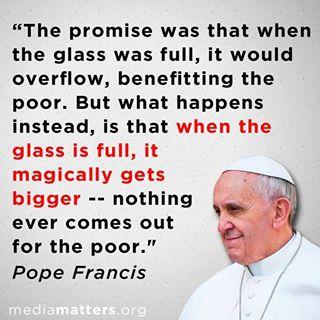
Catholics are obligated to care for the planet, just like care for the sick, Pope Francis says
Julie Zauzmer
Pope Francis, who has made the environment a clear focus of his papacy over the past three years, deepened his vision Thursday of a green church in which caring for the planet is as important a Catholic commitment as caring for the sick and the hungry.
Catholics currently subscribe to seven corporal and seven spiritual “works of mercy” — obligations that include sheltering the homeless, visiting prisoners and burying the dead. On Thursday, in an address explaining why Catholics must make practical changes in their daily routines to safeguard the earth that God created, Francis added care for the environment as an eighth work of mercy.
The modern world has new forms of poverty, Francis said, and thus requires new forms of mercy to address them.
“When we mistreat nature, we also mistreat human beings,” he wrote in his message for the World Day of Prayer for the Care of Creation, which falls on Sept. 1. He discussed the effect of global warming, which he noted is caused in part by human activity, on the world’s poorest people.
“This is leading to ever more severe droughts, floods, fires and extreme weather events,” Francis wrote. “Climate change is also contributing to the heart-rending refugee crisis. The world’s poor, though least responsible for climate change, are most vulnerable and already suffering its impact.”
Environmental awareness, along with concern for the world’s poor, especially in the global south, has been a clear concern of Francis’s papacy since he became the first non-European pope since the eighth century. His first major treatise as pope was last year’s “Laudato Si,” an encyclical on the environment that linked human mishandling of the climate to mistreatment of the poor. He quoted frequently from that encyclical in his message Thursday.
In this message, he said that every Catholic should go to Confession to repent his or her sins against the environment. Then that confession should lead to concrete changes in Catholics’ daily behavior, no matter how small: Francis suggests turning off lights to avoid wasting energy, taking care not to cook more food than necessary and using public transportation or carpooling to cut down on gasoline use.
Caring for the planet, Francis said, will be a new act of mercy alongside long-established forms of charity that were inspired by Jesus’ words in the book of Matthew. “For I was hungry and you gave me something to eat, I was thirsty and you gave me something to drink, I was a stranger and you invited me in, I needed clothes and you clothed me, I was sick and you looked after me, I was in prison and you came to visit me,” the text says.
To the five actions suggested in that passage, Catholics have also added burying the dead and giving alms to the poor to the list of corporal works of mercy, meaning physical actions. The list of seven spiritual works of mercy includes comforting the sorrowful, instructing the ignorant, and praying for the living and dead.
Francis said Thursday that care for creation actually belongs on both lists, spiritual and corporal. “Grateful contemplation of God’s world,” he said, is a spiritual mercy. And daily behaviors to protect the landscape of that world should be considered a corporal mercy.
William Dinges, a religious studies professor at Catholic University of America, said he has seen Francis’s earlier writings and speeches on the environment propel parishes to focus on ecological activism, and elevating that activity to a work of mercy will further spur Catholic volunteerism.
Catholics are long accustomed to social justice meant to help people, and are learning that helping the planet helps people too, Dinges said. “Where he’s really, I think, pushing us forward in Catholic social teaching is trying to get us to see that this is one problem. It’s not two, separate and unrelated,” Dinges said of the problems of climate change and poverty.
When Dinges started an eco-ministry in his own parish more than 25 years ago, few Catholics were concerned about the issue. Today, it’s at the forefront of parish discussions and theological inquiry, he said. “I could tell you 87 reasons to be concerned about the environment, none of which have anything to do with religion. But for those of us who are people of faith, this is a profoundly moral and religious issue,” Dinges said. “We are called to respond to it that way, with prayer.”
Brian Murphy contributed to this report. This post has been updated.
Want more stories about faith? Follow Acts of Faith on Twitter or sign up for our newsletter.
No comments:
Post a Comment